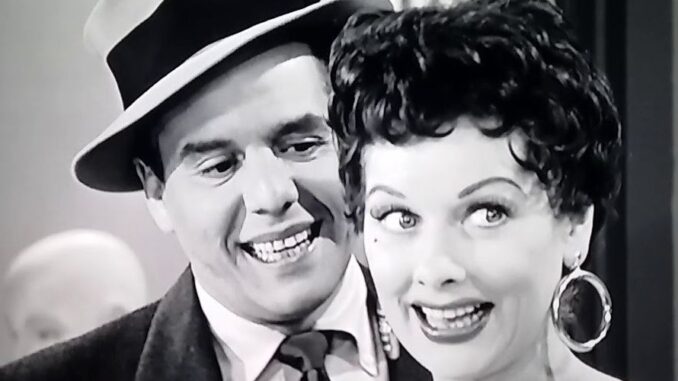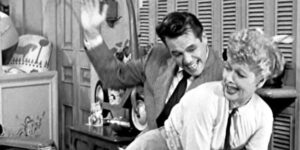
“I Love Lucy” remains a classic television show that defined sitcoms and paved the way for comedic storytelling. But, even though we still admire Lucy and Ricky’s hilarious adventures, there’s no denying that their relationship would raise more than a few eyebrows in today’s world. Many aspects of their marriage that were normal in the 1950s are now outdated or even problematic. Let’s take a closer look at 15 things about Lucy and Ricky’s relationship that simply wouldn’t fly if they aired today.
1. Ricky’s Dominance as the “Man of the House”
Back in the 1950s, a man being the “head of the household” was standard. Ricky regularly made decisions without Lucy’s input and expected her to obey his word without question. Today, we value equality in relationships and expect both partners to have a say.
2. Frequent Arguments Over Money
Lucy and Ricky had many heated discussions about money, often because Lucy would spend beyond their means. The way Ricky handled these situations sometimes came off as belittling. Nowadays, financial discussions are encouraged to be open and respectful, and joint financial planning is common.
3. Lucy’s Constant Scheming and Deception
In nearly every episode, Lucy would hatch some wild plan to deceive Ricky, often for trivial reasons. Today, we recognize honesty as a cornerstone of healthy relationships. Constant deception, even if humorous, isn’t something many viewers would find endearing in a marriage today.
4. Ricky’s Temper and Anger Management Issues

Ricky’s reaction to Lucy’s antics often included yelling and scolding, sometimes to an extreme. In modern storytelling, this kind of behavior is typically addressed through open dialogue or is presented as something to work on rather than laugh off.
5. Lucy’s Role as a Housewife
Lucy’s role was almost entirely focused on homemaking, cooking, and cleaning. While there’s nothing wrong with homemaking, today’s shows celebrate a broader range of roles for women, showing that a partner can contribute in any way that suits them, not just traditional roles.
6. Public Displays of Discipline
Ricky would often “discipline” Lucy by putting her in her place publicly or even playfully spanking her, which was considered harmless fun at the time. Today, such displays would be met with strong criticism, as they promote inequality in relationships.
7. Lack of Communication
Lucy and Ricky often struggled with open communication, a factor that created many of the comedic misunderstandings. Today, audiences expect characters to engage in healthier, open communication rather than bottling up issues or avoiding necessary conversations.
8. Ricky’s Work-First Attitude
Ricky was frequently away working at the Tropicana, leaving Lucy to fend for herself at home. Today, audiences appreciate characters who balance their careers and family life and work to support their partner emotionally, not just financially.
9. Gender Stereotypes in Parenting
Parenting in “I Love Lucy” was also filled with stereotypes. Ricky was often portrayed as detached, while Lucy was shown as the primary caregiver. In contrast, modern shows tend to highlight fathers as more hands-on, with both parents actively participating in raising their children.
10. Constant Manipulation for Attention
Lucy would go to extreme lengths to gain Ricky’s attention, often feigning situations or scheming to create drama. In today’s society, we understand that healthy relationships should have clear boundaries and that attention should be given willingly, not through manipulation.
11. Ricky’s Control Over Lucy’s Activities
Ricky often controlled Lucy’s social life and discouraged her from pursuing her dreams, including her desire to be in show business. In a modern relationship, encouraging a partner’s passions and ambitions is celebrated rather than stifling them.
12. Traditional “Boys’ Night Out” Mentality
Episodes often depicted Ricky going out for “boys’ night” while Lucy stayed home. The implication that men are entitled to nights out while women are expected to stay home is an outdated double standard. Today, both partners are encouraged to have social lives.
13. Jealousy and Mistrust
There were several episodes where Ricky or Lucy would get intensely jealous. Instead of addressing their insecurities, they’d use manipulation to “teach a lesson.” Nowadays, relationships are built on trust, with jealousy seen as an issue to discuss openly rather than playfully manipulate.

14. Outdated Views on Mental Health
Lucy’s schemes and antics sometimes pushed her to exhaustion, but mental health wasn’t openly discussed. Today, we value mental well-being, and if a character is struggling, it’s addressed respectfully rather than ignored for laughs.
15. Rigid Gender Roles in Everyday Life
“I Love Lucy” often highlighted strict gender roles that limited Lucy and Ricky’s understanding of each other. Today’s audiences enjoy seeing characters break out of traditional gender molds, sharing responsibilities, and supporting each other in whatever roles suit them best.
Conclusion
Looking back at “I Love Lucy” is a reminder of how far we’ve come in understanding relationships and personal growth. While Lucy and Ricky’s antics still make us laugh, many of their interactions are a reflection of a different time. If the show were reimagined today, it would likely place a greater emphasis on equality, respect, and open communication. Yet, the charm of Lucy and Ricky’s relationship will always be treasured, even as we recognize how cultural norms have evolved.
5 FAQs
1. Would Lucy and Ricky’s relationship be portrayed differently in today’s shows?
Yes, a modern version of their relationship would likely emphasize open communication, equality, and mutual respect rather than the more rigid gender roles seen in the original show.
2. Did audiences in the 1950s view their relationship as problematic?
No, many of the interactions between Lucy and Ricky were considered typical for the time, and audiences mostly saw them as lighthearted.
3. What made “I Love Lucy” a landmark show despite these outdated themes?
“I Love Lucy” was groundbreaking for its time, bringing laughter and showcasing a loving couple. Its humor, timing, and performances by Lucille Ball and Desi Arnaz set it apart.
4. How has the portrayal of marriage in TV evolved since “I Love Lucy”?
Television has since shifted to showcase more diverse relationships with a focus on balance, partnership, and respect between spouses.
5. Can we still enjoy “I Love Lucy” despite these outdated views?
Absolutely! While some aspects may feel out of touch, the show remains a classic that paved the way for future sitcoms, and we can appreciate it while acknowledging its context.